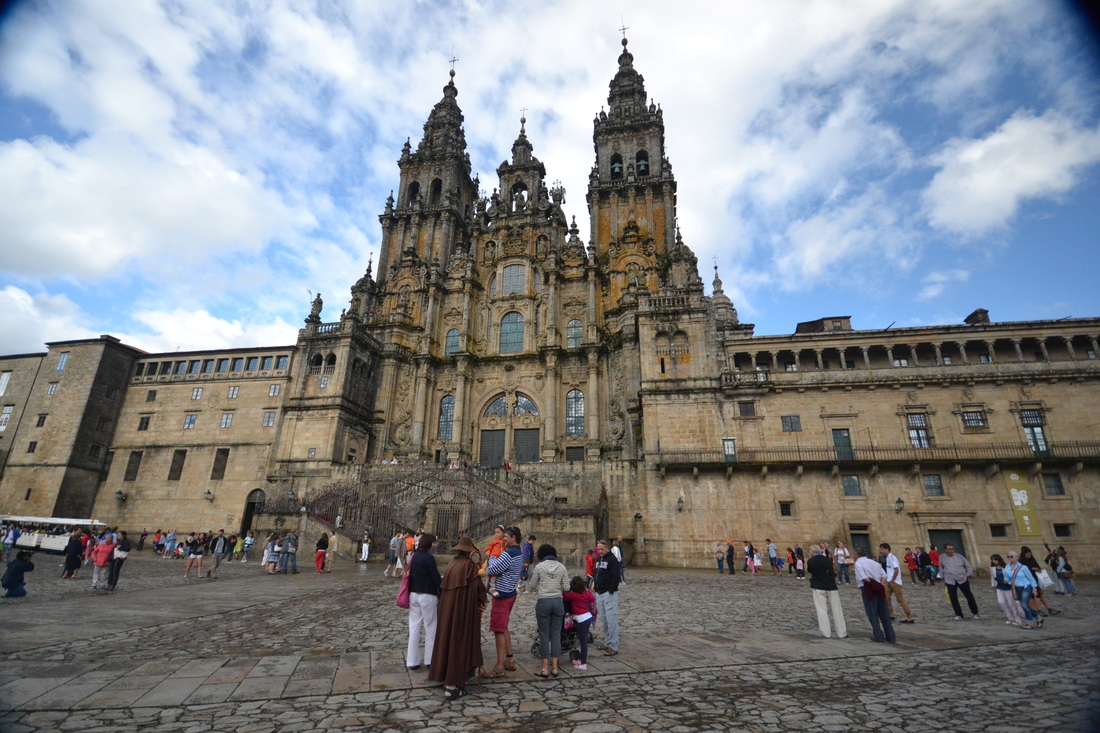Once in the French Pyrenees, they'll cross the mountainous border over to Spain and walk across the entire northern country terrain for about 6-8 weeks before finally arriving at the pinnacle of their pilgrimage: Santiago de Compostella. This awe-inspiring cathedral is considered to be the alleged burial site of Saint James the Great, one of the apostles of Jesus Christ. Many people who embark on this journey do so in reverence to Saint James, however, as I mentioned before, each walker or "pilgrim" ultimately decides to walk El Camino for their own highly specific and personal reasons.
Tracing back the roots of my father's family name (Gallegos) took me through Vigo, Isla Cies, A Coruña, Fisterre, Costa da Morte, Muros and Santiago de Compostela. I learned a lot about Galicia and the glacial-like Galician waters of the death coast, the longstanding fisherman culture, exotic sea cuisine, lush greenery, and the Celtic spiritual roots of the Galician people. When i arrived to Santiago I quickly discovered the magic inherent in the city. There was a peculiar air that invaded the crevices, cafes, parks, alleys, restaurants, museums, music, plazas and markets of Santiago. It was clear to me that there was something special in the atmosphere of this cloudy Galician city.
One of the greatest ways to spend a morning, afternoon or evening in Santiago is to sit down on the curb facing the front of the Gothically Baroque cathedral and simply observe and absorb the square's Galician funk and emotionally-charged happenings. People from all over the world finish their multi-week walk at this precise square, so tears of joy, spiritual surrender, religious experience, immense satisfaction, loving embraces, ecstatic happiness and many other emotional vortexes spill out into the perfectly quaint square in front of the imposing cathedral.
As I witnessed all of this, I noticed what appeared to be a panhandling old man wearing a beaten up grey suit and an over-worn fedora approaching me. Not wanting to be distracted from my laid-back afternoon activity, I waved him off before he got too close to me. The wave-off failed miserably and he started making conversation with me in Spanish. I asked him if he could speak Galician (Galego), the Portuguese-like dialect of the region and a language I enjoyed hearing phonetically. He spoke a few phrases in the dialect and then asked me if he could read me some poetry. It turned out the old man was a poet.
He had my full attention as he poured out rhythmically dramatic allegory straight into my mind. He knocked out poem after poem with his self-published book in one hand, but his full attention and eyes glued on me. The guy was looking right through me, I couldn't believe what I was hearing! Ten minutes ago I thought the poor old man was begging for money, but the flexible words I was hearing vibrate through his golden vocal chords were like nothing I've ever heard before. I was trancing out in a state of disbelief. "What a divine act of poetry!" I felt like I was floating away in a poetic bubble made up of the Logos. After finishing his third or fourth poem the old man simply thanked me and absconded. I couldn't believe what I just heard. Hearing out the defeated old man in a homeless suit recite his brilliant poetry was better than hearing Neruda. He completely and unexpectedly lit up my world with his words, and I knew I would never be able to hear his poetry again.
It's weird how easily unappreciated talent can go unrecognized, like spring water going down a drain. Looking back, I only wish I was able to record him in an attempt to save his living word in digital form. Since I wasn't able to do that, I'm featuring a video of Galician bagpipe music that was performed in one of the alleyways of the Santiago de Compostella Cathedral. The moral of this flashback is twofold: don't judge a bum and never let true talent go unrecognized.
Enjoy!

 RSS Feed
RSS Feed
